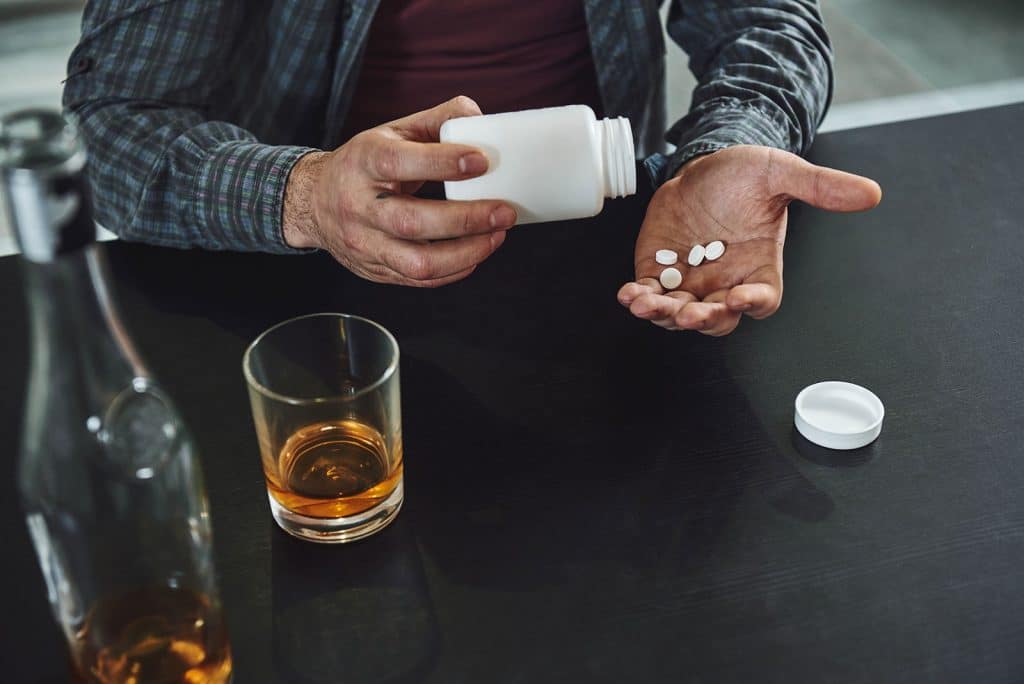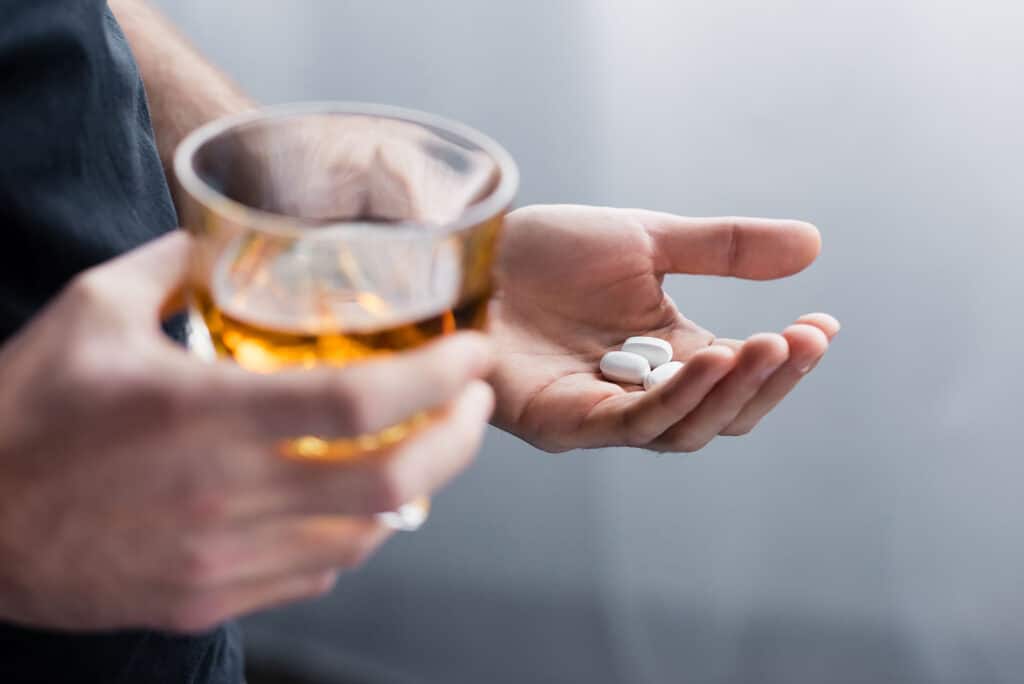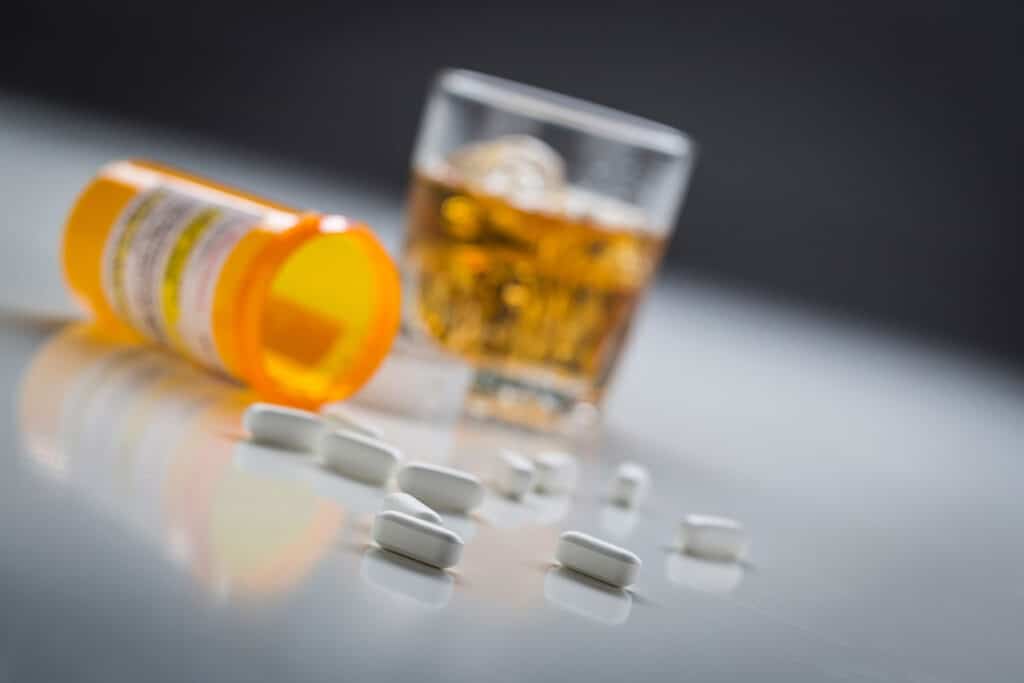Fluconazole is typically a harmless drug, but in rare cases, it can cause damage to the liver.
If you’ve been dealing with thrush or another type of fungal infection, your doctor may prescribe you fluconazole. Since this medication can interact poorly with other substances, you’ll need to be careful about what you eat and drink. Is it okay to combine fluconazole and alcohol? Keep reading our guide to find out.

Table of Contents
What Is Fluconazole?
Fluconazole is a common antifungal medication. Its main use is to destroy overgrowths of certain types of fungi. Doctors typically prescribe it for patients with many candida infections: oral thrush, yeast infections, or a penile infection called balanitis. Depending on your situation, your doctor might also prescribe it for certain types of urinary tract infections, meningitis, or other fungal infections.
This medicine comes in many forms, including topical creams and oral pills. It is most frequently sold under the brand name Diflucan and can also be found in other brand-name medications like Canesten. If you’re prescribed fluconazole, you must take it regularly for several days. Depending on your health condition, you need to take it for anywhere from one week to six months.
Will Alcohol Keep Your Fluconazole From Working?
Fluconazole stops infections by destroying fungal cell membranes. Due to how it works, alcohol won’t necessarily inhibit fluconazole’s ability to function. Most fluconazole prescriptions do not come with any instructions to avoid alcohol while taking the medication. Unlike antibiotics, taking a sip of alcohol won’t immediately make you sick or cause your fluconazole to stop working entirely. Medically speaking, there are no known interactions between fluconazole and alcohol.
Remember that this simply means alcohol won’t directly affect fluconazole’s ability to work. It doesn’t mean that combining fluconazole and alcohol is a good idea. The main issue with mixing the two drugs is that alcohol tends to support the type of fungal microbes that cause thrush or yeast infections. Alcohol contains a lot of sugar and fermented ingredients, and both of these substances can make fungal microbes grow out of control. While the fluconazole is trying to slow down fungal growth, the alcohol gives the fungus everything it needs to flourish.
This can lead to nasty antifungal-resistant infections. Especially if you consume a lot of sugar and alcohol while not following your prescribed fluconazole dosage, your infection might linger. Therefore, doctors tend to suggest skipping alcohol any time you have a fungal infection, regardless of what medication you take for it. By avoiding alcohol, you can speed up your recovery time and start feeling normal sooner.
Is It Safe to Mix Fluconazole and Alcohol?
Alcohol might not technically keep fluconazole from working, but don’t forget that combining the two can have other impacts on the body. Fluconazole is typically a harmless drug, but in rare cases, it can cause damage and cause liver problems. This damage to the liver is a severe enough problem that formerly healthy patients can develop jaundice and other symptoms of liver disease. Any time you take fluconazole, you need to look for yellow eyes, dark urine, abdominal pain, and other signs of liver damage.

Its ability to harm the liver means that fluconazole can be problematic when combined with alcohol. Studies find that roughly 5% of all people who take fluconazole end up with elevated liver enzymes. This minimal amount of damage is something a healthy liver can recover from. However, if you’re also combining it with drinking large amounts of alcohol, it can put a lot of strain on your liver. To be safe, limiting your drinking or stopping altogether while on fluconazole is better.
If you already have liver damage due to alcoholism or other health problems, it is not safe to take fluconazole regardless of how much you are currently drinking. Your doctor will typically recommend another medication to treat your fungal infection instead. It is very important to avoid fluconazole when dealing with issues like alcohol-induced hepatitis because even small amounts of additional injury can be too much for a damaged liver to deal with.
How Long Should You Wait Between Taking Fluconazole and Alcohol?
As you can see, it is usually a good idea to avoid taking fluconazole and alcohol simultaneously. Not only does alcohol make it easier for fungal infections to flourish, but the side effects of fluconazole can work with alcohol to harm your liver. How long do you need to stop drinking if you want to stay on the safe side?
Fluconazole stays in your system for a while, so it’s not as simple as waiting an hour between taking your pill and having a drink. Once you take fluconazole, it can linger in your system for up to 10 days. Conservative estimates suggest that your best option is to stay alcohol-free while taking the fluconazole and for 10 days afterward.
Meanwhile, alcohol leaves the system more rapidly. As long as your liver is in good health, you don’t need to wait days between taking alcohol and then consuming fluconazole. Instead, you usually just need to wait a few hours after alcohol consumption before you take your fluconazole dose. Remember that large amounts of alcohol take longer to clear your system. If you’ve been drinking excessively, you might need to wait at least a day before you start your medication.
How Much Alcohol Can You Safely Drink With Fluconazole?
When you’re taking fluconazole, no amount of alcohol is a good idea. If you absolutely must drink, it’s important to follow harm-reduction guidelines. First of all, try to avoid sugary, yeasty alcohols like sweet cocktails or beers. These are the types of beverages that can cause your fungal infection to flourish despite the fluconazole killing off some of the microbes.

Secondly, it is essential to avoid overdrinking. Drinking enough to harm your liver can increase the risk of you ending up with liver damage after taking fluconazole. How much is too much? Current medical research indicates that more than 30 grams of alcohol regularly per day can cause liver damage. Keep in mind that this might be less alcohol than you realize. 30 grams of pure alcohol per day equals two 12-ounce beers, 1.5-ounce shots of liquor, or 5-ounce glasses of wine.
Is Your Relationship With Alcohol Healthy?
If you’re in a situation where you’re considering prioritizing alcohol over medical attention, it might be time to reexamine your relationship with alcohol. Though having one or two drinks with fluconazole is technically safe, it’s not ideal. Most people will benefit from pausing alcohol while they take fluconazole, and being unable to do so can be a sign of an alcohol addiction.
An alcohol abuse disorder is typically characterized by drinking despite adverse consequences. A person dealing with addiction may continue to drink even though they realize that alcohol is causing personal, social, financial, or health problems. Those with an addiction often spend a lot of time thinking about, drinking or recovering from drinking alcohol, and they frequently end up drinking far more than initially attended. All of these warning signs indicate you should speak to a substance abuse healthcare professional.
Whenever you find yourself unhappy with your drinking levels but unable to cut down, Allure Detox is here to help. We provide a broad range of programs, including detox, residential rehab, and outpatient rehab. Our talented team works hard to give you the skills you need to fight addiction. Ready to get started? Contact us today to learn more about our services.
Summary
TL;DR: It’s not recommended to drink alcohol while taking fluconazole as it can increase potential side effects.
FAQ
How long does Fluconazole stay in your system?
Can you drink alcohol with a yeast infection?
References
- https://www.nhs.uk/medicines/fluconazole
- https://www.ncbi.nlm.nih.gov/books/NBK548300/
- https://pubmed.ncbi.nlm.nih.gov/2184510/
- https://www.ncbi.nlm.nih.gov/pmc/articles/PMC3321494/
- https://www.niaaa.nih.gov/publications/brochures-and-fact-sheets/alcohol-use-disorder-comparison-between-dsm


